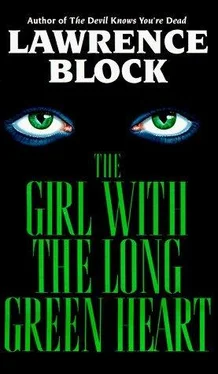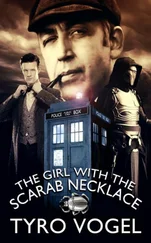“Doug told me you were married.”
“I told him about it. When I start feeling sorry for myself I get carried away. I probably filled his ear with a lot of that. I married this boy from Long Island that I’d met at school and we went to New York to play house. I was the mommy and he was the man who took the suds out of the automatic washer. I don’t know why I should be boring you with all this, John.”
“I’m not bored.”
“You’re easy to talk to, aren’t you?”
“Uh-huh. I used to be a psychiatrist before I turned crooked.”
“I could almost believe that. What was I talking about?”
“The suds and the automatic washer.”
“That’s right. Except that we played it a little different. I was the mommy and he was the baby, that’s what it all added up to, really. We never had enough money, either, and his parents hated me, really hated me, and then he started running around.”
“That’s hard to believe.”
“You’re nice, but he did. I didn’t really feel insulted by it, to tell you the truth. I had managed to figure out by then that he was a nice boy but that I didn’t want to spend the rest of my life with a nice boy who needed someone to wipe his nose and help him on with his rubbers. That came out dirty, I didn’t mean it that way. You know what I meant.”
“Uh-huh.”
“So I went to Reno and threw my wedding ring in that river there, and came back to Bolivar, and there was a job opening in Olean, the job with Wally, and I took it, and you know the rest. I became a very private secretary. At first it was exciting and then it was secure and then his wife did die, finally, after hovering on the edge for years, and then we weren’t going to get married after all and instead of a fiery affair it was a back-door thing with a bad smell to it.”
Her fingers tightened on the steering wheel. When she spoke again her voice was thinner and higher. “I felt so goddamned good this afternoon. Watching that man, so hot to find a way to make a new fortune for himself, so excited he couldn’t sit still. And knowing he’s just going to get his nose rubbed in it, and that I’m going to do the rubbing. Oh, that’s a sweet feeling!”
For a few minutes neither of us said anything. Her hands relaxed their grip on the wheel and she slowed the Ford and stopped at the curb. “There are things we ought to go over,” she said. “You’ve got to tell me how much I’m supposed to tell him, for one thing, and then there are the letters he gave me. I’ve got them in my purse.”
“Are we supposed to be making a night of it?”
“In a small way, anyway.” Her eyes narrowed. “He didn’t tell me how far to go playing the Mata Hari role. I guess I’m supposed to use my own imagination. There are bars we could go to, but they aren’t all that private.”
“My hotel room?”
“I thought of that. I think he might not like that. Everybody knows who I am, that I’m his secretary and that, well, that I’m more than his secretary. He might not like the way it would look if I went to your room.”
“Where, then?”
“My apartment?”
“Fine.”
“But I don’t think I’ve got anything to drink.”
We stopped for a bottle. I paid for it, and she insisted on giving me the money back when we got in the car. This was on Gunderman, she told me. He was footing the bill for the evening.
She lived in a newish brick apartment building on Irving Street. Her place was on the second floor. She tucked the Ford into a parking space out in front and we walked up a flight of stairs. She unlocked the door and we went inside. The living room was large and airy, furnished in Danish Modern pieces that looked expensive. The carpet was deep and ran wall-to-wall. It wasn’t hard to guess who paid the rent, or who had picked up the tab for the furnishings.
“I’ll hunt glasses,” she said. “How do you like your poison? Water, soda?”
“Just rocks is fine.”
She came back from the kitchen with a pair of drinks. We sat together on a long low couch and touched glasses solemnly. “Here’s to crime,” she said. “To successful crime.”
“By all means.”
We drank. She tucked her feet under her, opened her purse and pulled out a sheaf of letters. “He had a list of people who bought some of that Canadian land,” she said. “Not a complete list, but about twenty names. He wrote letters to all of them asking — well, you can read it yourself.”
I read one of the letters. It was brief and to the point. Mr. Gunderman was interested in any dealings or correspondence that Mr. So-and-So might have had with the Barnstable Corporation, Ltd., of Toronto. Would Mr. So-and-So please let Mr. Gunderman know, and would he also notify Mr. Gunderman if he had made any disposition of his holdings in northwestern Canada, or if he had any intention of so doing?
There were eighteen letters like that. Gunderman’s list didn’t match ours completely. He was missing a lot of the names we’d gotten from Al Prince, and he had one or two that Prince hadn’t given to us. I picked out the letters to the ten men with whom we’d been in correspondence and handed them back to Evvie.
“You can mail these,” I told her. “They’ll tell him just what we want him to know. A few of these pigeons already sold land to us, and the rest have heard from us.”
“What about the others?”
“I’ll keep them.”
“Won’t he get suspicious if he doesn’t hear anything from any of those men?”
“He’ll hear from them. What other letters did he dictate?”
I looked through them. There was a letter to the Ontario Board of Trade inquiring in a general way into the commercial purpose and history of Barnstable, and there was a very similar letter addressed to the Lieutenant-General’s office. I let those go through. Both of those sources would simply advise Gunderman that we had incorporated at such-and-such a date with so much capital, and that we had organized for the purpose of purchasing and developing land in the western provinces.
This was all a matter of public record, and it was something we wanted Gunderman to know. We could tell him ourselves, but it was much better to let him find out on his own hook from properly official government sources. Let him think he was being shrewd. If you let a man convince himself that he is much cleverer than you are, he will never get around to fearing that you’re going to pull a fast one on him.
“And this one here,” she said.
The last letter was addressed to a Toronto detective agency that specialized in industrial and financial investigations. Gunderman asked for a brief report on (a) the Barnstable Corporation, Ltd., (b) Douglas Rance, and (c) John Hayden.
“He asked me to put a call through to these people,” Evvie said. “I told him I couldn’t get through to them and I killed the call, and then he put it all in a letter. I was a little afraid of what might come out. I know he used this agency before, when he got taken the first time.”
“I don’t think this letter should go out.”
“That’s what I figured. And why I cut off the call. If a detective dug into things too deeply—”
“Uh-huh.”
“But if he doesn’t hear from them at all—”
“He’ll hear from them,” I said. I swallowed some Scotch, got a cigarette going. She pursed her lips, moistened them with the tip of her tongue. She started to say something, then changed her mind and finished her drink. I went into the kitchen, filled a bowl with ice cubes, brought it and the bottle back into the living room. I put the bowl on the coffee table and added fresh ice and fresh Scotch to our glasses.
“What should we drink to this time, John?”
Читать дальше












